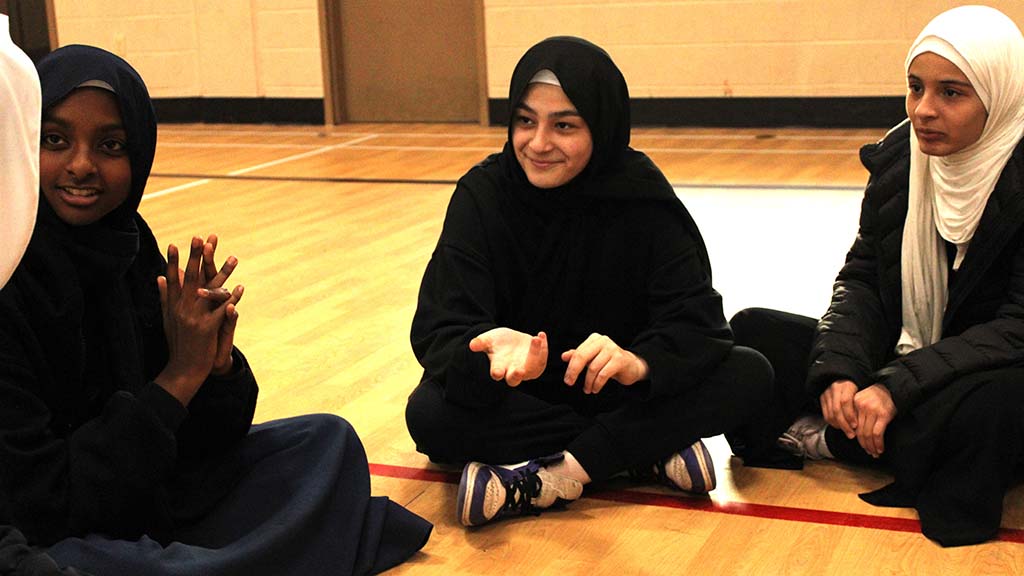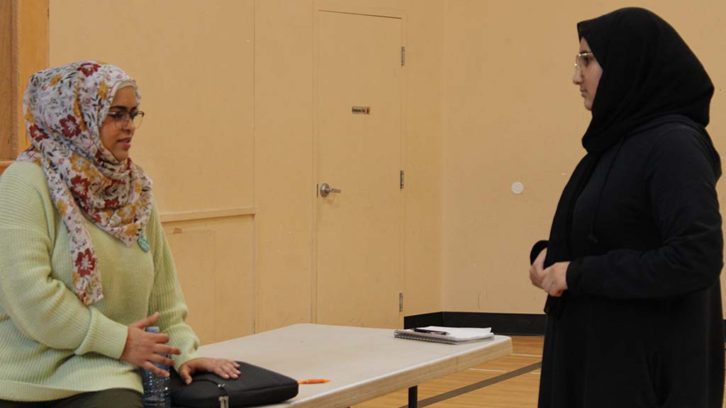First transition home for Muslim women in Halifax educates students on domestic violence
Junior high and high school students learn about warning signs, available services

caption
A few Martime Muslim Academy Students discussing domestic violence in groups after presentation by Zeinub BegZeinub Beg works to help women escape domestic abuse, but she knows that to be more effective, her message needs to get to young people.
That’s why, after the grand opening of Nisa Homes, the first transition home in Halifax catering specifically to Muslim women, earlier this month, she made her first school visit to speak with students.
She visited the Maritime Muslim Academy on Tuesday, and her presentation to students from Grades 7 to 12 explained what the transition home does, what domestic violence is, how to safely escape these situations and what services are offered by Nisa Homes.
“It’s important to educate people, and that starts with our kids because change comes with new generations,” Beg said. Related stories
Beg, Nisa’s case manager, is also in charge of the overall management of the home.
“I wish it was something that we had talked about when I was In school,” she said.
In her presentation, Beg said that almost half their clients are children, making it important for younger people to be educated on the topic.
“There’s things that we don’t realize because it’s normalized,” Beg said in an interview. “There’s a lot of things that we just aren’t told because it just doesn’t work in our favour.”
In her presentation, she said people facing domestic violence often don’t talk about it, because they’re worried about what others may think. She said it’s important to reach out because there’s nothing wrong with seeking help.
Nisa Homes provides access to shelter, basic necessities, child care, life skills workshops, mental health support, spiritual support, and many other services.
Beg said their services are faith-based and culturally responsive.
“We take into account our clients’ cultural and religious backgrounds and come from a trauma informed lens,” she said. “We allow our clients to come as they are with whatever beliefs they might have. We allow them to be in an environment where the person who’s providing them care looks a lot like them and understands where they are coming from.”
Beg said that along with visits to Muslim schools, it would be helpful to visit public schools as well. She said there is a lot of diversity in public schools, and talking about domestic violence is important for everyone.

caption
Case manager Zeinub Beg speaks with a student about domestic violence after her presentation on Tuesday.‘Abuse can happen to anyone at any age’
Allison Lasher, a teacher at the Muslim academy whose students listened to the presentation, taught in different schools for six years. It’s her first time seeing education on domestic violence given to students, and she strongly supports it.
“It’s really good to know about domestic violence because abuse can happen to anyone at any age,” she said.
Lasher said this type of education can help students support each other, and know what type of services are offered in their community.
“It’s good for them to know what the signs are for their own families and for their futures,” she said.
She said these presentations should be given in all schools because awareness of domestic violence benefits everyone.
Grade 11 student Yahia Fathalla said the presentation helps students prepare.
“If obstacles come and we don’t know how to deal with them, then what are we going to do?” he asked.
Fathalla said that if students are uneducated and go through domestic violence, it might be too late before they realize that they need to seek help from an organization such as Nisa Homes.
“If you can learn to avoid domestic violence from the start, then it will be beneficial to have more successful relationships, more successful futures, and a more successful life in general,” he said.
A safe place to go
Maritime Muslim Academy principal Abdallah Yousri is also the executive director of the Ummah Society, which is Nisa Homes’ partner.
Yousri said it is important for students to hear this information “so they understand their rights and be aware that this service and this safe space is available for them.”
Yousri said that Nisa Homes Halifax received clients in the home the first day it opened. It makes him sad, but also happy to know that there is such service being provided to those who need it.
“The other services available are very limited and this is considered the first of its kind, not just in Halifax, but in the whole region,” he said.
Grade 10 student Noor Sadieh said that this education is needed because it lets students know that if they do face domestic violence, they have somewhere safe to go.
“For Muslim girls that don’t know about Nisa Homes, they don’t have any support on domestic violence,” she said.
About the author

Sondos Elshafei
Sondos is a fourth-year BJH student at the University of King's College. She has published articles in the Dalhousie Gazette and in magazines....
